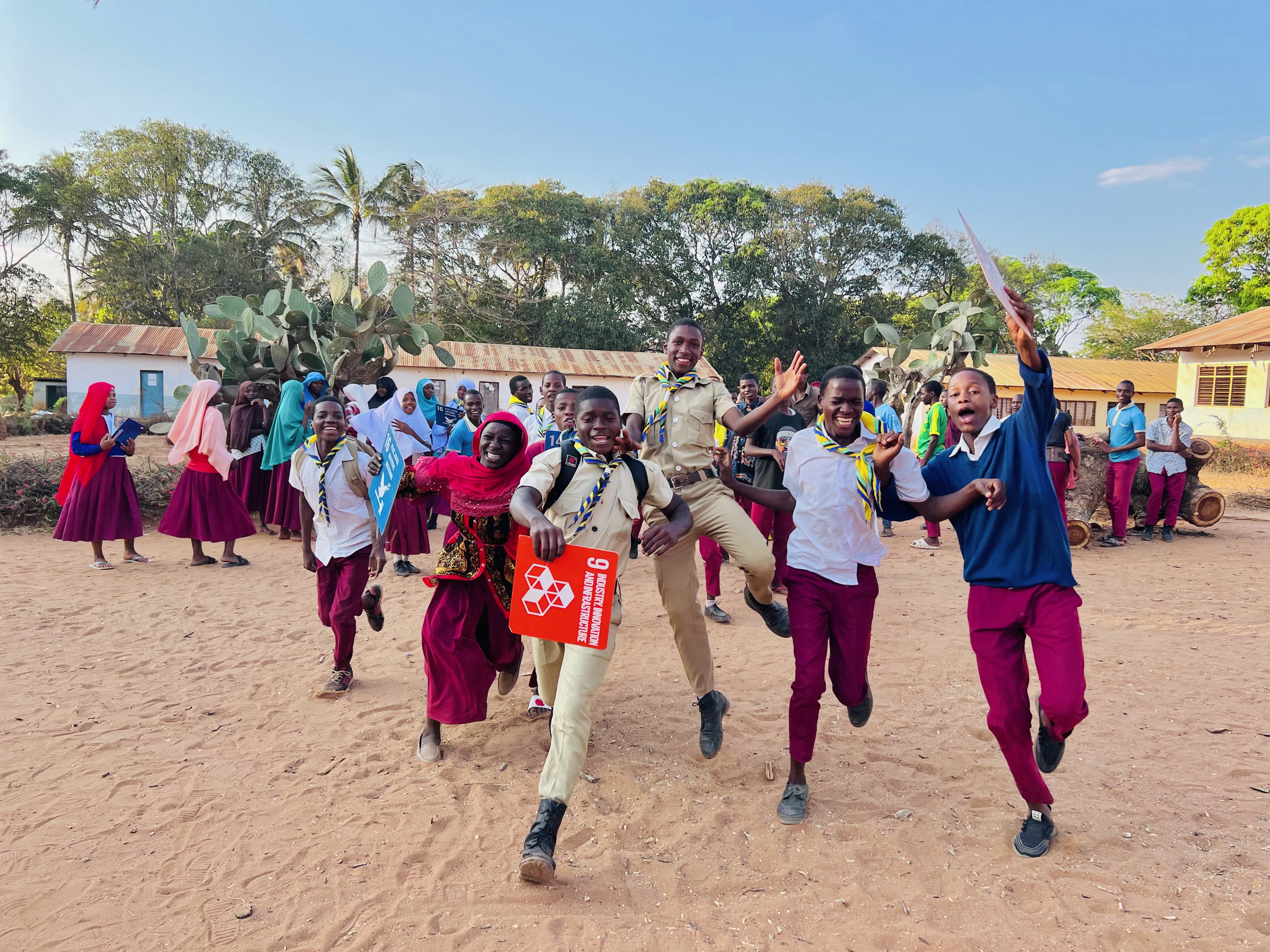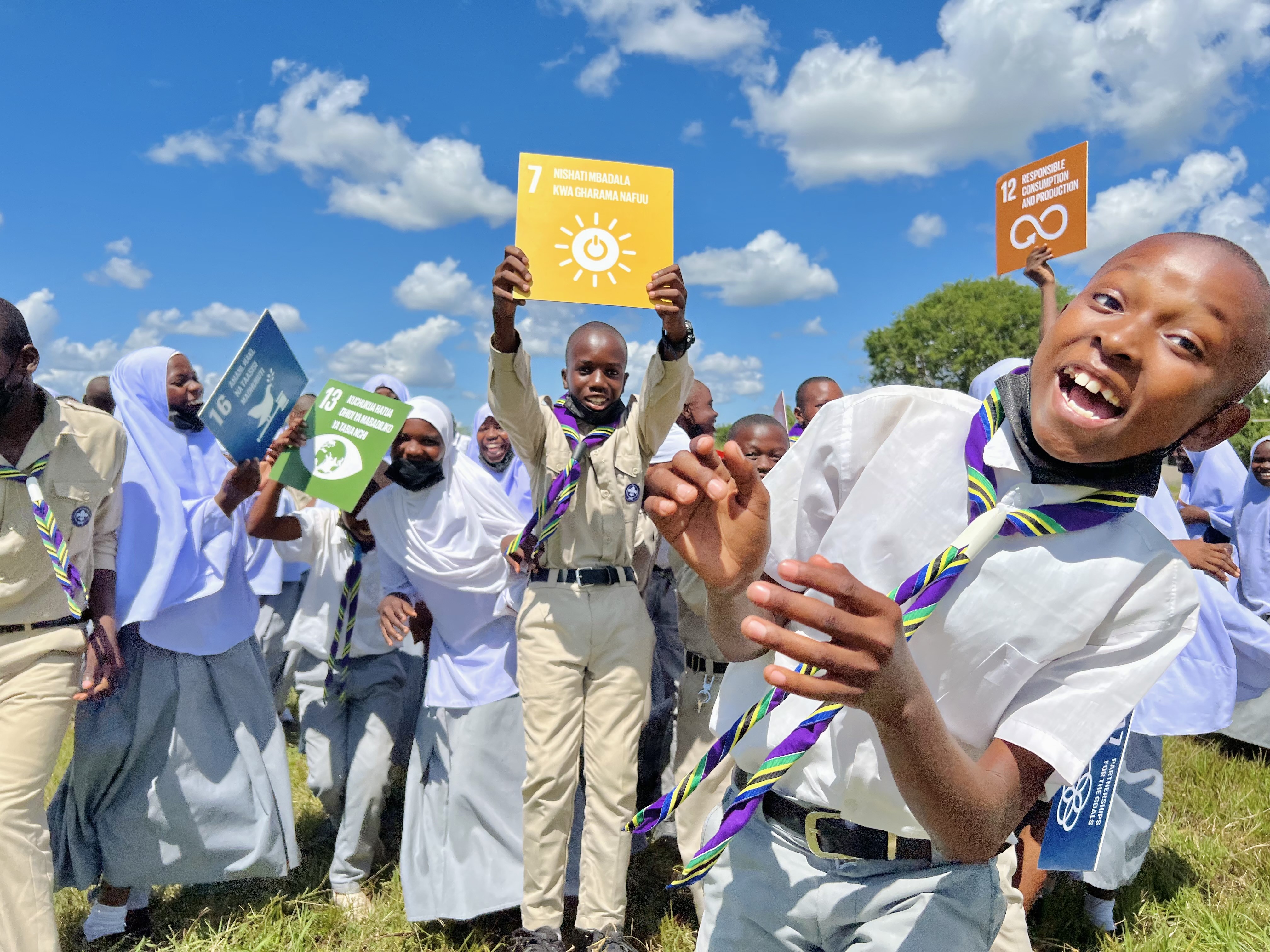#VijanaNaAmani255: youth lead the charge toward safer societies in southern Tanzania
February 28, 2023

Members of a youth peace club at a school in Ruvuma, the southernmost region in Tanzania.
An innovative youth-led peacebuilding project in the southern borderlands of Tanzania is mobilizing residents to participate in peacebuilding activities in their communities. #VijanaNaAmani255, which translates to “youth and peace” in Kiswahili, was launched in 2022 by the United Nations Development Programme (UNDP) and the Global Peace Foundation.
#VijanaNaAmani255 is building a cadre of young people who support the creation of resilient communities by promoting the notion that individuals can be agents of change, no matter their age.
In the country’s southern most regions, Lindi, Mtwara and Ruvuma, extreme poverty and gaps in the education sector have led to high rates of school dropouts. The economic environment is challenging, marked by a lack of information about available opportunities for young people. These challenges combined with other vulnerabilities have created a breeding ground for extremist groups to influence and recruit young people.
The project rationale understood that more frequent instances of hostility contribute to fueling even more fear and insecurity. Moving beyond reacting to extremism and concentrating on prevention measures instead, allows communities, through the project, to address the drivers of violent extremism. This approach has been promoted globally by the UN Secretary-General's Plan of Action for Preventing Violent Extremism.
The project also supports the implementation of the East African Plan of Action on Youth, Peace and Security, working closely with the Tanzania Scouts Association, the Mwalimu Nyerere Foundation, the Youth of United Nations Association of Tanzania, and the Global Network of Religions and Children. The Prime Minister’s Labour, Youth, Employment and Persons with Disabilities Unit, under its Social Protection Division, serves as the government partner.
Joseph Brighton Malekela, the Coordinator of #VijanaNaAmani255, is a passionate youth worker and a UN-trained Youth Champion of Sustainable Development Goals in Tanzania. “To date, the project has impacted 148 leaders of local government authorities, 150 youth representatives from influential community groups, 1,526 students in schools and colleges, 60 religious leaders, 30 cultural leaders, 20 parents and 20 caregivers. We have also reached over 10 million indirect beneficiaries through an online campaign,” Malekela adds.
The project’s main activity, to empower youth, address insecurity and prevent violent extremism, is carried out by peace clubs at schools and colleges. At the clubs, young people learn about peace and security concerns in their area, build capacity to tackle dis- and misinformation, and enhance social cohesion by encouraging exchanges with religious leaders, local authorities and members of the community.

The Tanzania Scouts Association is one of several partners on the ground that make the #VijanaNaAmani255 project happen.
“I had a limited understanding of what peacebuilding means before participating in these sessions,” explains Yusuph Mohamed, a student at Mbuyuni Secondary School in Mtwara. “I used to believe that creating and maintaining peace was the sole duty of security institutions, like the army and police.”
A crucial element of the project is the inclusion of religious leaders. “Most people associate violent extremism with the Islamic religion,” noted Sheikh Mangochi, of Mtwara. “As religious leaders, we are doing our best to enlighten youth to be agents of peace in the community.”

Religious leaders are key players in the #VijanaNaAmani255 project. Religious leaders discuss peacebuilding during a project session in southern Tanzania.
Malekela considers #VijanaNaAmani255 to be a sustainable project. He says the peace clubs in schools and colleges are thoroughly monitored to ensure they are operating under specific guidelines.
Plans are in place to conduct regular joint dialogues with youth groups, religious leaders and local government authorities. These dialogues will continue to construct information bridges between different segments of society and allow healthy discussions to take place so that communities can devise joint strategies for peacebuilding. Additionally, the project will train youth to engage in community outreach on peacebuilding, using door-to-door methods.
The long-term vision of #VijanaNaAmani255 is to expand to more regions across Tanzania, such as Arusha, Kagera, Kigoma, Mara, Pemba-Zanzibar and Tanga, all of which have been grappling with insecurity and violence over recent years.
“We envision a society free from violence and gender disparities to bring sustainable peace and harmony to the community,” Malekela said. “We would like to see a Tanzania that engages youth and women in peace and security as well as in all decision-making processes at the grassroots level.”
This development-based approach to tackling the root causes of violent extremism is in its pilot stage, and hopes to inform the government in its design of a National Strategy and Action Plan on Prevention and Responding to Violent Extremism in the country.
I am grateful to have acquired knowledge about peacebuilding through the #VijanaNaAmani255 peace club. I now have a broader understanding of the concept and I’m aware that it is everyone’s responsibility, including myself. Therefore, I have been raising awareness about peacebuilding at school with my fellow students and at home with my family and friends. It’s important to emphasize good behaviour and ensure everyone partakes in the process of building peace.- Yusuph Mohamed, Mbuyuni Secondary School, Mtwara

 Locations
Locations



